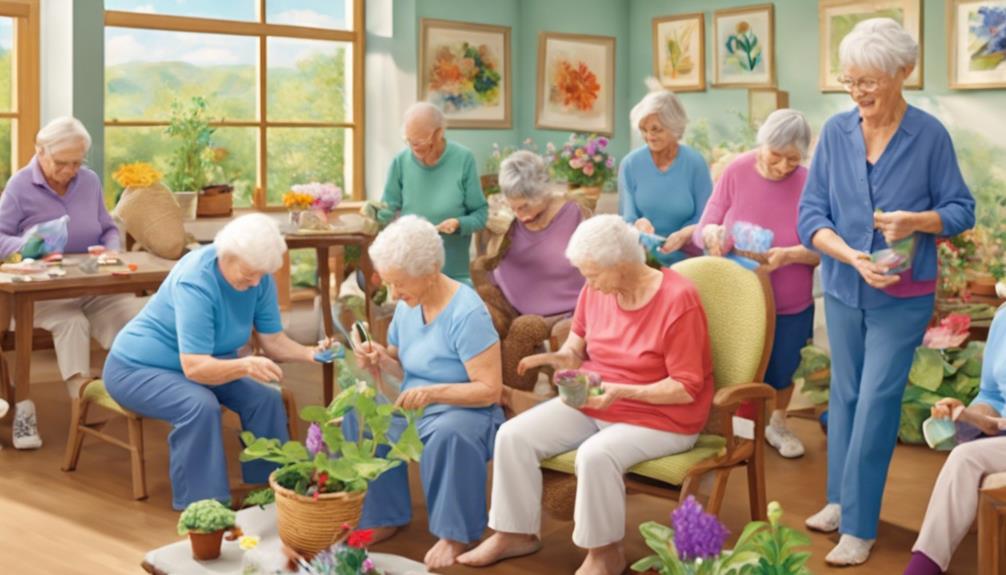Picture a situation in which a grandmother, even though she is dealing with dementia, brightens up with happiness as she takes care of her tiny herb garden, her expression showing resolve and recollections.
Engaging activities play a crucial role in enhancing the well-being of individuals living with dementia, offering a way to connect, stimulate the mind, and foster a sense of accomplishment.
As we explore these 10 expert ideas further, we uncover a wealth of possibilities that can truly make a difference in the lives of those with dementia.
Key Takeaways
- Nature walks and gardening enhance cognition, mood, and social interaction.
- Music therapy and pet interactions boost emotional well-being and connections.
- Memory games and sensory activities improve cognitive stimulation and relaxation.
- Creative arts, cooking, and crafts foster expression, communication, and social engagement.
Outdoor Nature Walks
Embarking on outdoor nature walks can greatly benefit individuals with dementia by reducing stress, enhancing mood, and boosting physical activity levels. For those living with dementia, these walks offer more than just a change of scenery. Research shows that walking in natural environments can actually enhance cognitive function and memory.
The sensory stimulation provided by nature – the sight of trees, the sounds of birds, the feel of a gentle breeze – can evoke positive emotions and a sense of calmness. These walks not only promote relaxation but also create opportunities for social interaction and connection with the environment, enriching the overall well-being of a person with dementia.
Music Therapy Sessions

Music therapy sessions, a proven method for enhancing the well-being of individuals with dementia, offer a range of benefits including reducing agitation, improving mood, and enhancing communication skills. Engaging in music therapy can evoke emotional responses, stimulate memories, and promote social interaction among dementia patients. These sessions provide a safe and supportive environment for individuals to express themselves through music, even when verbal communication becomes challenging.
Research has shown that music therapy is a non-pharmacological intervention that can help decrease anxiety, depression, and behavioral issues in people with dementia. Whether it involves singing, listening to familiar songs, playing instruments, or rhythmic activities tailored to individual preferences, music therapy aims to enhance the quality of life and overall well-being of those living with dementia.
Creative Arts and Crafts
Engaging in creative arts and crafts can have significant therapeutic benefits for individuals living with dementia. Through art, we can stimulate memory, evoke emotions, and enhance communication with our loved ones.
Crafting together fosters connection, sparks joy, and allows for moments of shared creativity and expression.
Therapeutic Benefits of Art
Participating in creative arts and crafts can significantly enhance the well-being and cognitive function of individuals with dementia. Engaging in art activities improves memory recall, emotional well-being, and non-verbal expression. Art provides a unique form of communication, fostering connections and reducing feelings of isolation. The therapeutic benefits of art extend to sensory stimulation, where activities like painting, collaging, and sculpting can evoke positive memories and boost self-esteem. Through art therapy, individuals with dementia experience decreased anxiety, depression, and agitation, leading to relaxation and stress relief. Embracing creative arts and crafts as a part of dementia care can have profound effects on the overall quality of life for those living with this condition.
| Therapeutic Benefits of Art | ||
|---|---|---|
| Cognitive Function | Memory Recall | Emotional Well-being |
| Non-Verbal Expression | Communication | Sensory Stimulation |
Stimulating Memory Through Crafts
Crafting activities have been shown to trigger memories and enhance cognitive function in individuals with dementia, offering a creative and therapeutic outlet for self-expression and emotional well-being. Engaging in creative arts like painting, knitting, or scrapbooking can evoke a sense of nostalgia and joy, fostering a deep connection to past experiences.
Crafting projects such as memory boxes or collages provide a platform for seniors with dementia to reminisce about cherished memories and relationships, promoting emotional expression and a feeling of accomplishment. Simple activities like pasta threading or coloring not only enhance fine motor skills and hand-eye coordination but also serve as a soothing and enjoyable way to engage with the world.
Enhancing Communication With Creativity
To enhance communication in individuals with dementia, creative arts and crafts activities offer a powerful avenue for self-expression and emotional connection. Engaging in activities like painting and crafting not only stimulates cognitive functions but also encourages emotional connections through artistic expressions. These creative projects provide a non-verbal outlet for self-expression, evoking memories and emotions in dementia patients. Crafting endeavors such as scrapbooking or making memory boxes can help individuals with dementia reminisce and share stories with others. Participating in creative arts and crafts can significantly boost self-esteem, reduce anxiety, and promote a sense of accomplishment in individuals with dementia.
| Creative Arts & Crafts Activities | Benefits | Tips for Success |
|---|---|---|
| Painting | Stimulates cognitive functions | Provide a variety of brushes |
| Crafting | Encourages emotional connections | Use colorful and textured materials |
| Scrapbooking | Promotes self-expression | Include familiar photos |
| Memory Boxes | Evokes memories and emotions | Incorporate meaningful objects |
| Collaborative Projects | Fosters social interaction | Encourage group participation |
Memory Recall Games
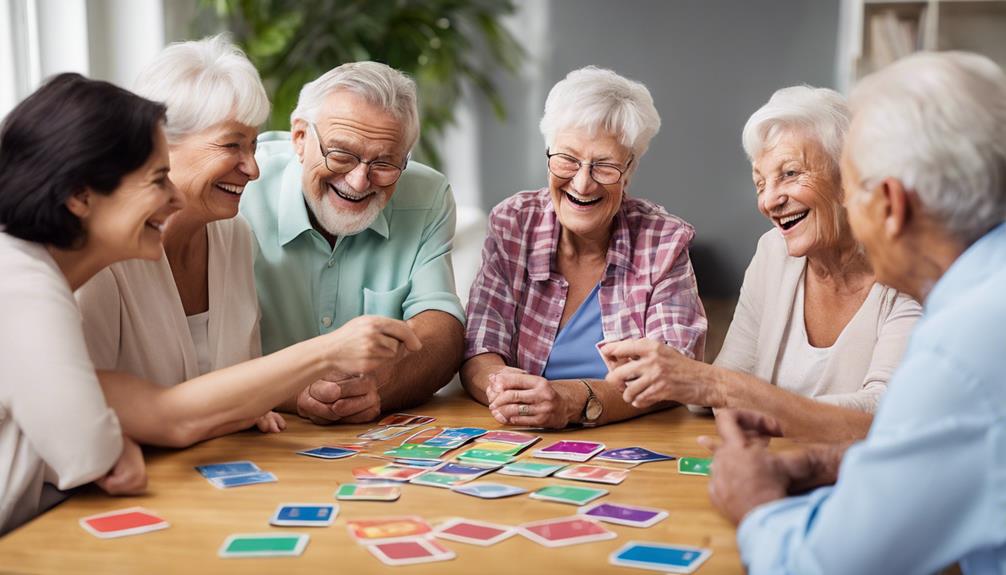
Stimulating cognitive functions in individuals with dementia, memory recall games offer a beneficial way to improve memory retention and recall abilities. Engaging in these games not only exercises the brain but also enhances mental acuity and cognitive skills.
Here are four ways memory recall games can positively impact individuals with dementia:
- Boosting Confidence: Memory recall games provide a sense of accomplishment when individuals remember details, boosting their self-esteem and confidence.
- Encouraging Social Interaction: These games can be enjoyed in a group setting, fostering social connections and reducing feelings of isolation.
- Creating Joyful Moments: The interactive nature of memory recall games often leads to moments of joy and laughter, enhancing emotional well-being.
- Preserving Memories: By regularly engaging in these games, individuals may better retain and recall cherished memories, fostering a sense of continuity and identity.
Memory recall games not only slow down memory decline but also provide meaningful and enjoyable experiences for those living with dementia.
Sensory Stimulation Activities
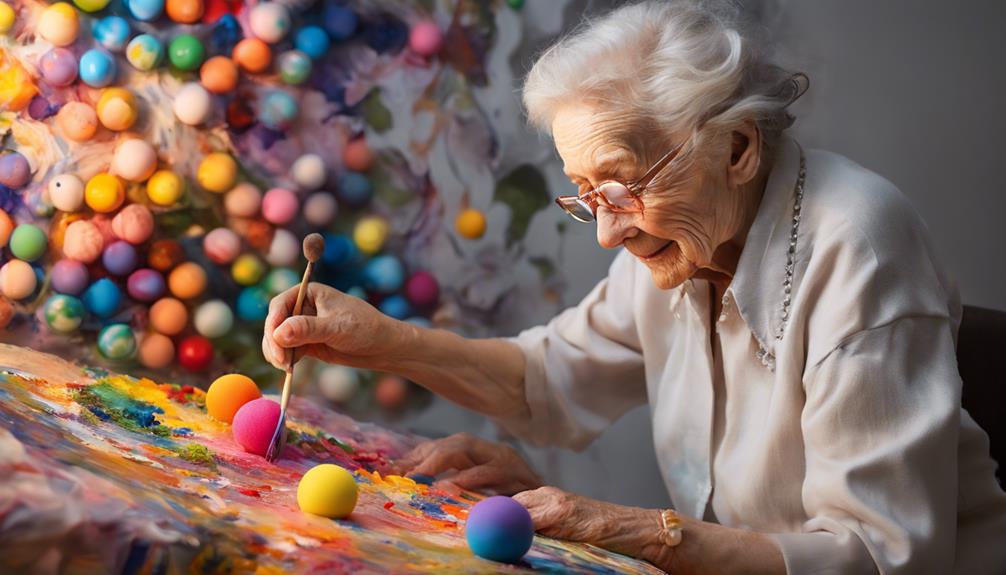
When it comes to sensory stimulation activities for dementia patients, engaging in touch-based experiences can be incredibly beneficial. By incorporating activities that involve feeling different textures like silk, burlap, wool, and linen, we can provide a rich tactile experience.
Additionally, exploring aromatherapy can also enhance sensory stimulation and promote relaxation for individuals with dementia.
Touch-Based Sensory Activities
Engaging in touch-based sensory activities can offer valuable tactile and cognitive stimulation for individuals with dementia, enhancing their sensory perception and promoting relaxation. When incorporating such activities, consider the following:
- Explore Textures: Introduce various textures like silk, burlap, wool, and linen to engage the sense of touch and evoke memories.
- Sort Shapes: Sorting wooden beads by shape provides both tactile and cognitive stimulation, aiding in focus and mental agility.
- Enhance Focus: Engaging in sensory experiences through touch can help improve concentration and reduce feelings of anxiety.
- Foster Connection: By exploring textures and shapes, you can create a calming and engaging experience, fostering a sense of connection and well-being for dementia patients.
Aromatherapy for Dementia
Utilizing essential oils to engage the sense of smell can provide soothing benefits and enhance the well-being of individuals with dementia. Aromatherapy, using oils like lavender, peppermint, and lemon, can promote relaxation and reduce anxiety, offering a holistic approach to care.
By triggering positive memories and emotions, aromatherapy contributes to an overall sense of calm and contentment. Managing behavioral symptoms associated with dementia becomes more manageable through the calming effects of aromatherapy.
Incorporating these scents into daily routines creates a pleasant environment that nurtures the senses and fosters a feeling of comfort. Aromatherapy stands as a valuable tool in dementia care, offering a gentle and effective way to support individuals in their journey towards improved quality of life.
Cooking and Baking Together

Cooking and baking together with individuals affected by dementia can create meaningful and stimulating experiences that engage their senses and foster a sense of accomplishment. When engaging in these activities, it's crucial to consider safety measures to ensure a positive and enjoyable experience for everyone involved.
Here are four essential tips for cooking and baking with dementia patients:
- Choose Simple Recipes: Opt for easy-to-follow recipes like no-bake cookies or fruit salad to ensure success and enjoyment during the cooking session.
- Encourage Participation: Involve dementia patients in the cooking process to let them experience different textures, smells, colors, and flavors, enhancing their sensory engagement.
- Focus on Engagement: Cooking activities promote engagement, creativity, and a sense of accomplishment, boosting their overall well-being and mood.
- Prioritize Safety: Ensure a safe cooking environment by supervising closely, using proper tools, and setting up precautions to prevent accidents and foster a positive cooking experience.
Gardening Therapy Sessions

Gardening therapy sessions offer invaluable benefits for individuals living with dementia, providing a holistic approach to improving their well-being and quality of life. Engaging in gardening activities can significantly enhance cognitive function, memory recall, and overall well-being for dementia patients. Research indicates that these sessions promote relaxation, sensory stimulation, and a sense of accomplishment in seniors with dementia. Moreover, gardening provides opportunities for physical exercise, sensory engagement, and a connection to nature, all of which are particularly beneficial for individuals living with dementia. By incorporating gardening into care plans, dementia patients can experience increased social interaction, improved sleep patterns, and reduced levels of agitation.
| Benefits of Gardening Therapy for Dementia Patients | ||
|---|---|---|
| Reduced stress levels | Enhanced cognitive function | Increased social interaction |
| Lowered blood pressure | Improved memory recall | Enhanced sensory stimulation |
| Mood improvement | Sense of accomplishment | Better overall well-being |
Pet Therapy Interactions
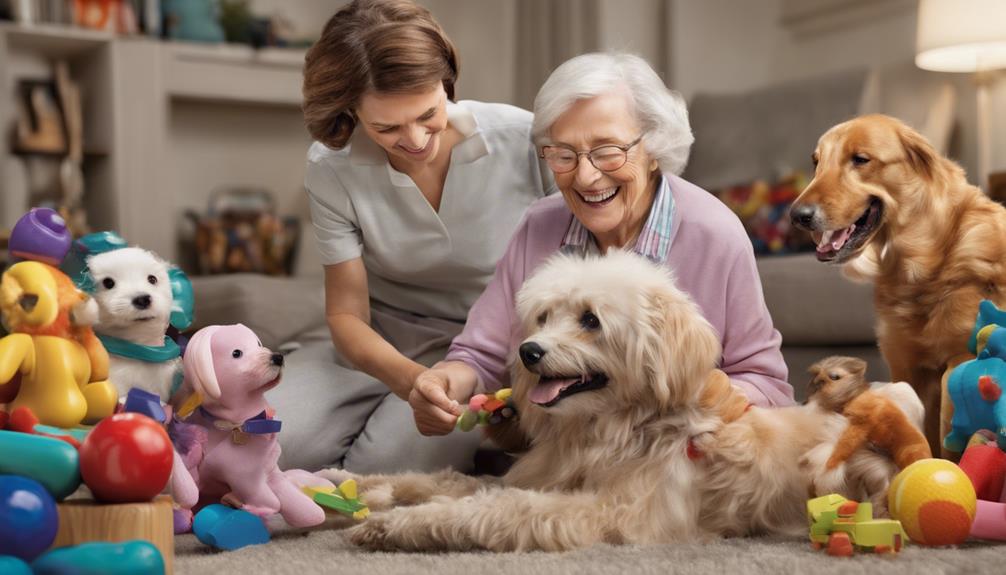
Interacting with therapy animals has been shown to significantly reduce agitation and enhance social interactions in individuals living with dementia. Pet therapy not only brings joy but also provides a sense of companionship and emotional support for those facing the challenges of dementia. Here are four ways pet therapy interactions can positively impact individuals with dementia:
- Agitation Reduction: Pet therapy has the power to soothe and calm individuals, reducing feelings of restlessness and agitation.
- Enhanced Social Interactions: Through interactions with therapy animals, individuals with dementia can experience improved social connections, promoting a sense of belonging and engagement.
- Decreased Loneliness: The presence of therapy animals can help combat feelings of loneliness and isolation, fostering a sense of comfort and companionship.
- Improved Well-being: Studies have shown that pet therapy sessions contribute to overall well-being by boosting mood, reducing stress, and increasing feelings of happiness.
Exercise and Movement Classes
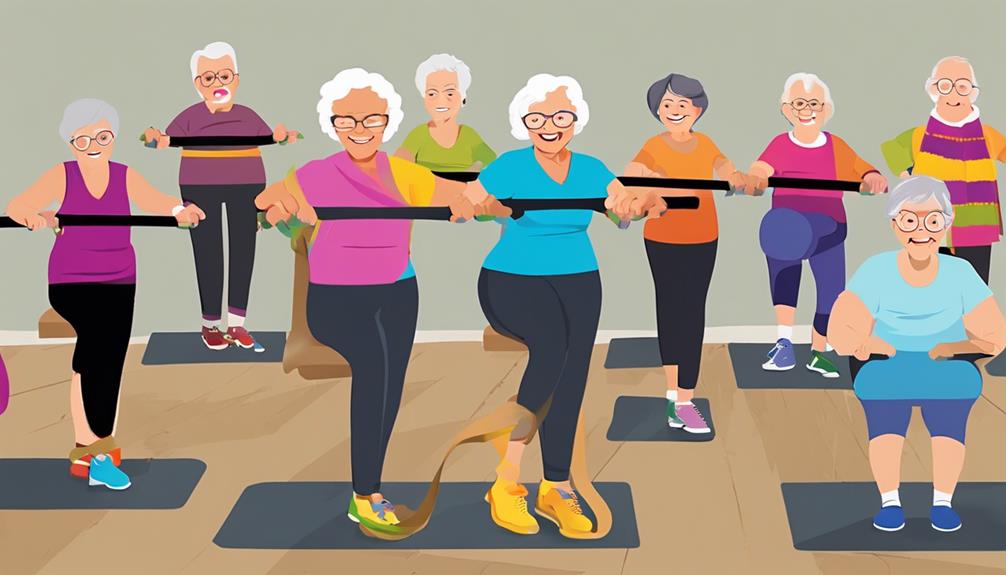
Engaging in exercise and movement classes is a beneficial way for individuals with dementia to improve physical health and cognitive function while fostering social interaction and overall well-being. These classes offer a holistic approach to wellness by not only enhancing physical health and reducing the risk of falls but also by promoting cognitive function and emotional well-being. Activities like dancing or gentle yoga incorporated into movement classes provide a fun and engaging way for individuals with dementia to stay active and connected.
Moreover, the social interaction provided by group exercise classes is invaluable. It creates a sense of community and support that can greatly benefit individuals with dementia. Through regular participation in these programs, individuals can experience an improved quality of life and a greater sense of independence. Overall, exercise and movement classes play a vital role in enhancing the well-being of those living with dementia, offering not just physical benefits, but also cognitive and social advantages that contribute to a more fulfilling life.
Virtual Reality Experiences
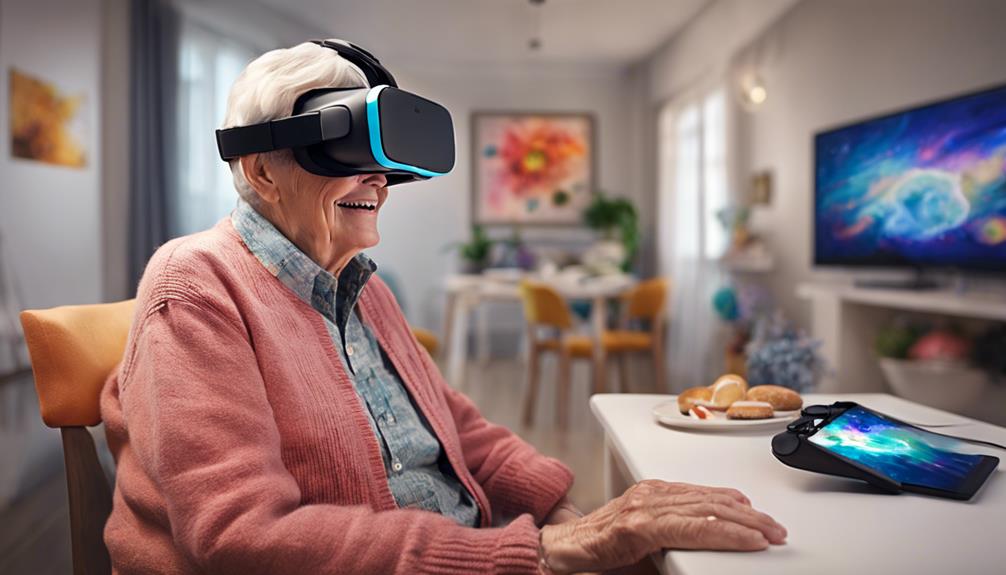
Immersive virtual reality experiences have emerged as a powerful tool in enhancing the well-being and cognitive function of individuals living with dementia. Virtual reality experiences tailored for dementia patients offer personalized, interactive journeys that can have profound therapeutic benefits. Here are four ways in which virtual reality can positively impact dementia patients:
- Evoke Positive Memories: Virtual reality programs can transport individuals with dementia to different environments, triggering nostalgic feelings and fostering a sense of joy and reminiscence.
- Promote Relaxation: Through immersive experiences, VR technology can help reduce anxiety levels, promote relaxation, and create a calming atmosphere for dementia patients.
- Enhance Cognitive Function: Virtual reality activities stimulate the mind and senses, encouraging cognitive engagement and potentially improving cognitive health in individuals with dementia.
- Provide Therapeutic Benefits: Integrating virtual reality therapy into dementia care can enhance the quality of life, promote social interaction, and offer individuals a sense of adventure and exploration, all contributing to their overall well-being.
Frequently Asked Questions
What Are Some Ideas to Stimulate Dementia Patients?
When looking to stimulate dementia patients, we focus on engaging activities that cater to their unique needs. Encouraging memory-stimulating exercises like looking through photo albums, participating in crafts such as pasta threading, and exploring sensory experiences like watching fish movements can be beneficial.
Incorporating tactile textures and fostering creative expression through painting or creating Memory Boxes are also effective ways to engage and stimulate individuals with dementia.
What Are Meaningful Engagement Activities for Dementia Patients?
Engaging in meaningful activities is crucial for dementia patients. Tailoring activities to their preferences, abilities, and interests can significantly improve their quality of life. Stimulating cognitive functions through reminiscing, sensory activities, and creative outlets like painting or music can foster emotional well-being.
Social interactions, such as group activities and shared meals, promote a sense of belonging and connection. Understanding individual needs and providing appropriate engagement can make a positive impact on dementia patients.
How Do You Entertain Someone With Advanced Dementia?
When entertaining someone with advanced dementia, we focus on activities that cater to their senses and memories. Sensory experiences like touch, music, and familiar scents can bring comfort.
Engaging in simple movements, looking at photos, or watching nature videos can offer stimulation and connection. Incorporating favorite objects, foods, and reminiscing about the past can help maintain a sense of self.
Providing gentle touch, massages, and a peaceful atmosphere can bring reassurance and comfort.
How Do You Keep a Dementia Person Busy?
We keep a dementia person busy by engaging them in simple craft projects, encouraging light physical activities, providing memory-stimulating tasks, involving them in household chores, and utilizing sensory stimulation activities.
These activities help keep their minds and bodies active, giving them a sense of purpose and accomplishment.
It's important to offer a variety of activities that cater to their interests and abilities, fostering a positive and engaging environment for them.
Conclusion
In conclusion, these engaging activities for dementia offer a pathway to positivity, purpose, and pleasure for individuals living with memory loss.
By embracing outdoor nature walks, music therapy sessions, creative arts and crafts, and more, caregivers can create cherished moments of connection and joy.
Let's continue to cultivate compassion, creativity, and camaraderie in our care routines, ensuring that every day is filled with meaningful moments and memorable experiences for our loved ones.





